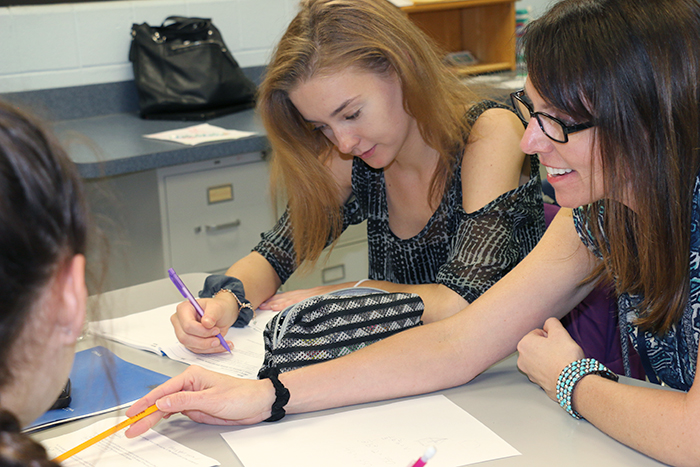What teachers can learn from students
When a student walks from the DGS halls into their classroom at 8 a.m., they are there with the intended purpose of achieving a quality education. What some people don’t realize, however, is that in the classroom setting, not only are students learning and maturing — so are teachers themselves.
As a matter of fact, many teachers said they have been left speechless by what they learn from their students. Specifically, with each interview conducted there has been a common theme that the resilience instilled in so many young students have inspired many educators.
This is especially true for Laura Rodey, who is going on her ninth year teaching social studies at DGS.
“I have learned so much from students over the years. I have seen amazing resilience — I have seen students face obstacles that no young person should have to face, and figure out how to thrive. Young people are often criticized as ‘just kids,’ but I think that is unfair. Yes, I have seen high school students make some dumb decisions, but I have also seen them be inquisitive, kind, compassionate and leaders for younger students,” Rodey said.
Bryan Szweda, another social studies teacher here at DGS, echoes the importance of having that considerate perspective when teaching. This is something he realized years ago with a specific class that had some “motivational issues” due to the things they were dealing with at home.
It is not unlikely for a student to leave an assignment uncompleted. However, when Szweda and his co-teacher Dan Maas noticed that many students were continually not doing their homework, they made the effort to see what went wrong.
“My co-teacher [Mr Maas], and I asked our students to journal why they thought that they were struggling to get work done. Many of these responses were absolutely heartbreaking in what our students were facing in their lives. Even many of the students who from outward appearances, seemed as if they were doing well, were dealing with significant challenges,” Szweda said.
“Some of the things that these students had dealt with in their lives dwarfed anything that I had faced, and helped me understand why they were struggling,” Szweda said.
Art teacher Robyn Bican also agreed that it’s important to realize each person has different circumstances and ways of learning.
“Don’t always assume that everyone is the same learner. I found out that I could not always assume a students knowledge or disposition. Instead I needed to investigate what they knew and what they were able to do,” Bican said.
Every person deals with their own set of obstacles. But especially for a student to go through something so burdensome at such a young age, it’s easy to want to give up. However, the determination they have now will only prepare them for further issues in the future.
Not only do students persist in the face of personal or familial adversities, some also refuse to give up in pursuing their educational goals.
Glenn Spitler, after 33 years teaching English here at DGS, is retiring this year. Yet despite his many years of experience, he’s inspired by the insightful new things he learns everyday.
“I really enjoy those experiences when students are so engaged in the material. They see things I’ve never noticed and that happens quite a bit actually,” Spitler said.
Along with bringing a different perspective on academic matters, work ethic is definitely impressionable for many teachers. This is especially true for long-time math teacher Timm Linders.
Many students in his AP Calculus classes will tell you that Linders always points out a specific student he taught years ago when trying to motivate others.
Even years later, he still has a very fond, vivid memory of this student who worked hard the entire year and achieved a passing score of 3 on his AP test.
“I can recall that exact moment. When I got that score I literally jumped out of my chair. That was the greatest reaction I’ve had in numeral fives in the AP. That three that that kid got, was by far the best score,” Linders said.
“We don’t want you to be perfect. We just always want you to do your best. If your best is whatever, and you reach that, we’re ecstatic for you. I’ve just met some students who have taught me what it means not to give up. They keep going and going and keep plugging through. When they get there, it’s the greatest thing ever,” Linders said.
The power of perseverance truly inspires many.
Not only are teachers inspired by a student’s fight through adversity, they’re also impressed with how the generations have shifted in young students are learning to accept themselves and others around them.
English teacher Zachary Kuhn has most definitely admired this.
“There are students here who refuse to hide who they are, whether in how they dress or who they love or what their passions are. That’s truly inspiring, because being ‘different’ used to mean isolation and loneliness,” Kuhn said.
Contrary to popular belief, even physical education teachers notice remarkable traits of their students. Lauren Hoel has been working here at DGS for 27 years, and gives insight as to how the outspokenness of some students have inspired her.
“Be brave enough to share. In health, we talk about personal and tough topics. I have personal experience with some of those topics and I share more now than I used to. I think sharing vulnerability makes us more human. That’s hard sometimes,” Hoel said.
Of course, however, there’s no way a person can work with kids and not experience light-hearted moments. Senior Riya Bhasin describes one of her favorite characteristics in an educator.
“I think a remarkable teacher is someone who teaches with a passion for truly being able to help students learn, and allows their personality to mix with the students as well so the students aren’t afraid to be themselves in front of the teachers,” Bhasin said.
Senior Faith Ley also chimes in what she thinks makes a noteworthy teacher.
“I like teachers that are not afraid to joke around with kids. Obviously, there is a time to be serious, but those who at least try to make jokes and lighten the mood I feel also helps to keep students engaged and less likely to zone out during class,” Ley said.
Humor engages people. Linders became animated when asked about his favorite part about being a teacher.
“One of the reasons that I like teaching is because it keeps you young. Being around young people and their liveliness and their enthusiasm in general … when you’re around that kind of energy, it gives you that energy,” Linders said.
With that being said, because of how influential the media is nowadays, you’ll probably see a group of teens huddled over a cell phone, bubbling with laughter over the latest meme.
A few certain memes have piqued Kuhn’s interests.
“The Honey Bun Baby meme and the ‘DAMN DANIEL’ meme are both highlights,” Kuhn said.
Even Andrew Kaim, another math teacher at DGS has picked up on the latest lingo.
“I think the phrase is, ‘why you being so extra?’ I think that’s kind of hilarious. There’s others too. A lot of students say, ‘to be honest’ over, and over again so now I just kind of say ‘tbh’ or ‘smh’ because I’m shaking my head, like I’ll say those things in class just to mess with them,” Kaim said.
However, while some teachers manage to get a laugh out of their students, sometimes using “teen lingo” ends up being a tad awkward.
“The older I get, the more awkward it is when they teach me slang and then I use it. When I first started teaching, one of my classes taught me ‘gucci.’ So later that period, I explained to them the ‘gucci’ reading we were about to start. I honestly think they all threw up in their mouths a little bit. It is amazing how uncool something becomes when a teacher tries to use it,” Rodey said.
The word, “school,” may bring among mixed emotions from both students and stuff. But all grueling aspects aside, both parties have the opportunity to be enlightened by others.
Linders cannot stress enough that, “every student kind of expands your horizons of this world.”
Therefore, students do make a difference. Even if someone does not always open up about the things they notice, every person would do well to realize that they have the power to inspire.


